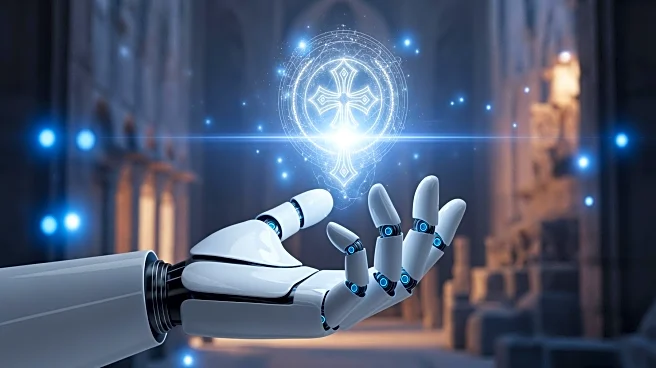What's Happening?
The AAR/SBL annual meeting is focusing on the intersection of artificial intelligence and religion, with over a dozen sessions dedicated to exploring how AI technologies like ChatGPT and large language models are influencing religious studies. Scholars
such as Randall Reed and Tracy J. Trothen are leading discussions on the implications of AI for religious practices, beliefs, and communities. The conference includes workshops and sessions that address the moral and ethical questions raised by AI, such as its role in steering cars, answering phones, and piloting drones. These discussions aim to understand AI's impact on spirituality, ethics, justice, and human identity.
Why It's Important?
The integration of AI into religious studies is significant as it challenges traditional notions of spirituality and ethics. AI's ability to influence religious practices and beliefs could reshape theological discourse and community dynamics. The conference highlights the need for human oversight to mitigate AI biases, especially in amplifying marginalized voices and preserving theological nuances. As AI technology advances, it poses questions about moral responsibility and freedom, which are crucial for religious communities and scholars. This exploration is vital for adapting religious practices to modern technological contexts while maintaining human dignity and agency.
What's Next?
The conference will continue to explore AI's role in religious contexts, with sessions addressing human-AI interactions, theological questions of agency, and the concept of 'relational intelligence.' Scholars will present papers on topics like AI-driven Qur'an translation and Catholic approaches to AI. These discussions aim to prepare religious communities for the potential shifts AI may bring to their practices and beliefs. The cautious and thoughtful response advocated by the conference organizers suggests ongoing dialogue and adaptation as AI technologies evolve.
Beyond the Headlines
The ethical and cultural dimensions of AI in religion are profound, as they challenge age-old human impulses to define the extraordinary. The conference's focus on AI's impact on marginalized voices and cross-cultural translation highlights the potential for AI to either reinforce or dismantle existing biases. This exploration could lead to long-term shifts in how religious communities engage with technology, emphasizing the importance of maintaining human oversight and ethical considerations in AI development.
















